Demosthenes
Demosthenes (384/383-322): Athenian politician, considered to be the greatest orator of Antiquity.
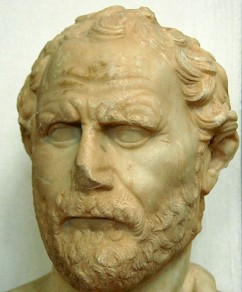
During the fourth century, the Greek towns were even more divided than in the fifth century, when the Peloponnesian League and Delian League had given some semblance of order to the Greek world. During the Peloponnesian War (431-404), however, Persian gold started to play a role and this was usually sufficient to ensure an endless series of wars among the "Yaunâ". Meanwhile, Macedonia was united by king Philip II, gained strength, and after 346, it was clearly the strongest power in Europe.
The Athenian politician Aeschines (c.390-c.315) tried to make the best of it. In his view, the best way to protect Athenian independence was peaceful coexistence with Macedonia. A war could not be won. With the benefit of hindsight, we know that this was the correct reading of the signs of the times, but not everyone agreed. Aeschines' main opponent was the orator Demosthenes, who proposed resistance to Macedonian imperialism.
His father had been a producer of arms and died in 377, leaving the family fortune to his six or seven year old son. His mother educated him, while relatives and friends took care of the money. According to Demosthenes, they actually stole it, and he therefore accused them as soon as he was old enough. The guardians were convicted in what became a famous lawsuit. There's something strange about the incident, however. Demosthenes had been taught speaking by a man named Iasus; even if he did it for free, Demosthenes must have had sufficient time to be with him, which can only mean that he was richer than he wanted to admit, and this in turn can only mean that the guardians had not embezzled a very great deal.
Demosthenes continued his studies in the school of Isocrates, one of the greatest orators of the mid-fourth century. Stories about a study at the Academy of Plato are probably later inventions.
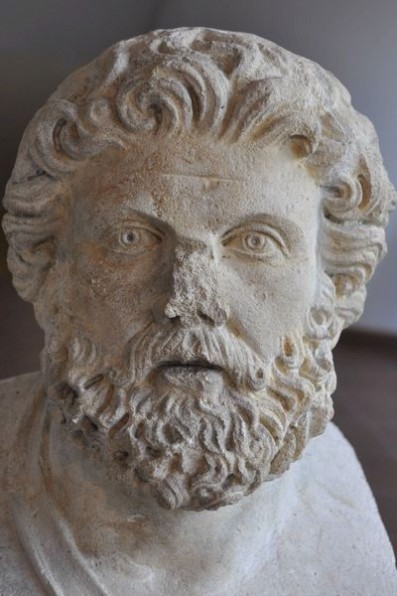
Demosthenes' career as a specialist on international relations started in 355 but it took him a couple of years to find his role as the archenemy of the Macedonian king Philip II, whom he had correctly identified as the greatest threat to Athenian autonomy, and -incorrectly- thought could be beaten. In 351, Demosthenes warned his fellow citizens against cooperation with the northern kingdom, in a speech that is known as the First Philippic. Other Philippics were to follow, and the expression "philippic" has been proverbial ever since.
Generally, Demosthenes' policy was one of straightforward confrontation. When the city of Olynthus applied for help in 349, he argued for rapid and massive intervention, but the Athenians could only respond slowly and with insufficient troops, so that the city fell in 348. Even this small intervention appears to have exhausted Athens, which was still recuperating from the losses it had suffered during the Social War (357-355).
Demosthenes knew when to negotiate. In 347/346, he and Aeschines were members of the embassy to king Philip that concluded the treaty that became known as the Peace of Philocrates. >One of the terms of this treaty was the surrender of Amphipolis to Macedonia, something that most Athenians found unacceptable.
>Demosthenes immediately started to distance himself from the treaty, and in 343, when it had become clear that renegotation was impossible, he accused Aeschines for his conduct during the negotiations, claiming that he had accepted bribes from the king. The accusation was probably untrue, but Demosthenes was popular. In the end, Aeschines was only acquitted because he was supported by the military leader Phocion and the orator Eubulus.
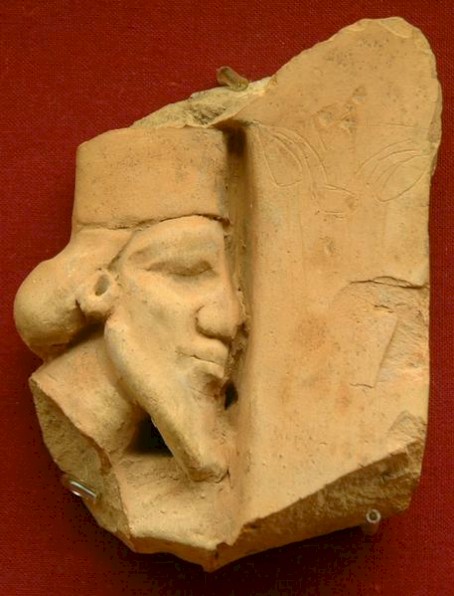
Demosthenes continued to prepare his country for a war with Macedonia, which he thought was inevitable. He proposed a new "Hellenistic League" like the one that had once fought against the Persian king Xerxes, but now directed against the Macedonian danger. He also argued for close cooperation with Xerxes' descendant, king Artaxerxes III Ochus, who sent splendid presents to Demosthenes. In new Philippic Speeches, the orator exhorted the Athenians to rise up and prepare for a fight.
War was eventually declared in the Autumn 340, when the Macedonian king had laid siege to Perinthus and Byzantium and threatened the Athenian food supply. Demosthenes proposed a reform of the taxation system to raise more money for the naval policy, but the war was not to be decided at sea. In August 338, a united army of Athenians and Thebans was defeated at Chaeronea by king Philip and his son Alexander. During the next weeks, Demosthenes prepared everything for the siege of Athens, but the Macedonian crown prince came as a negotiator to Athens and offered reasonable peace conditions, which the Athenians accepted.
In 337, they joined the Corinthian League. This was, in fact, the Hellenic League that Demosthenes had once proposed, but now presided by Philip, who wanted to unify all Greek city-states in one alliance. Together, they would attack the Achaemenid Empire, where a crisis of succession was taken place. Philip even sent his trusted general Parmenion to Asia, but he never joined the panhellenic war against the Persian himself, because he was murdered in October 336. Demosthenes announced the murder during a meeting of the Athenian assembly, dressed as if he wanted to visit a party.
During the next weeks, the Greek mercenary leader Memnon of Rhodes, who was a commander in the Persian army, pushed back the army of Parmenion, and Demosthenes opened negotiations with Attalus, Parmenion's fellow-commander and a well-known personal enemy of the new king of Macedonia, Alexander. However, before Attalus could raise a rebellion, Parmenion killed him.
But Demosthenes was not at the end of his energy. He forwarded Persian money to Thebes, which revolted against king Alexander in the summer of 335. The new Macedonian leader marched to the south and sacked the ancient city before it had received reinforcements. Athens was forced to make apologies and an official embassy congratulated him with his accession, "a bit late", as the historian Arrian of Nicomedia dryly comments.
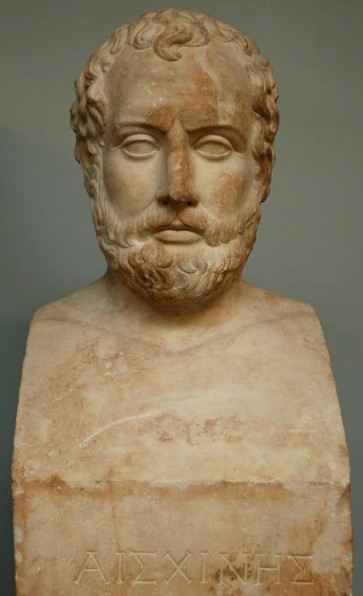
Although Demosthenes' policy had ruined Athens, he remained popular, and his policy to support Alexander's campaign in Asia not too enthusiastically was widely endorsed. An otherwise unknown politician named Ctesiphon even proposed to offer Demosthenes a gold wreath. Aeschines was against this and indicted Ctesiphon as the author of an illegal measure, which appears to have been a correct assessment of the proposal. This famous speech is called Against Ctesiphon (more...).
Demosthenes' even more famous counter-speech On the crown, however, convinced everybody that Aeschines' accusations were mere formalities. Demosthenes presented himself as the true patriot, said that all his acts had been supported by many people, and implied that the Athenians, if they found him guilty, in fact condemned themselves. This converted the trial into a plebiscite about recent Athenian policy. His speech, considered to be the best speech by the best orator of Greece, was a triumph and in a hostile, anti-Macedonian climate (the Spartan king Agis III was preparing for war against the Macedonians), Aeschines was fined and retired into exile in Asia Minor (330).
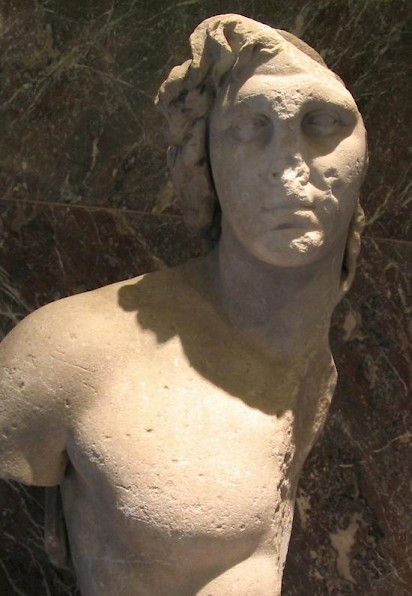
The policy of king Alexander became increasingly autocratic, and in 324, there were widespread rumors that his viceroy Antipater, who left behind to keep an eye on the Greeks, wanted to revolt in Macedonia proper. Alexander's decree about the exiles caused even more unrest in Greece, and at the same time, a courtier of Alexander named Harpalus fled to Greece with an immense amount of money.
Alexander's request to receive divine honors did nothing to take away the problems. Demosthenes retorted with the famous remark that as far as he was concerned, Alexander could be venerated as son of Zeus, "and as son of Poseidon as well, if he wants to". Demosthenes embarked again upon a war policy, and although he appears to have made mistakes and was briefly exiled because he had not been more successful, there was indeed a Greek insurrection when Alexander died on 11 June 323 in Babylon (the Lamian war).
The orator returned to Athens, and again tried to organize a panhellenic revolt against Macedonia. For a while, the Greeks were indeed successful, but after a year of war, the Macedonians were ultimately victorious during the battle of Crannon. After this defeat, Demosthenes was condemned again by the Athenians, and committed suicide.
Demosthenes has always been regarded as the greatest orator of Antiquity, and it is not exaggerated to say that his death marked the end of Greek political speech. Many of his speeches have survived, because in the third century, a first scholarly edition was prepared (by Callimachus of Cyrene).
Literature
Plutarch's Life of Demosthenes is available at LacusCurtius.